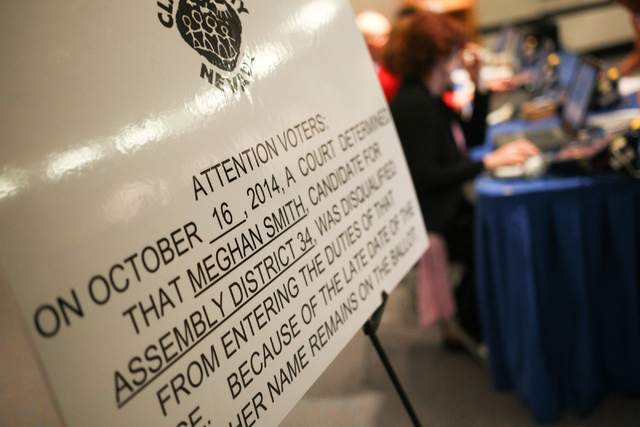Hey, remember that one ruling…?

Since the problem of would-be legislators who run for office but don’t live in the districts they seek to represent seems to be growing, not receding, it makes sense the Legislature would try to address it.
Several bills have been introduced this session to deal with the problem, including some by successfully elected politicians who ran against people found to be improperly running for office. Assemblywoman Victoria Seaman, R-Las Vegas and Assemblywoman Shelley Shelton, R-Las Vegas, introduced Assembly Bill 177. The bill passed the Assembly on a party-line vote last week and is now in the state Senate.
(Seaman ran against Democrat Meghan Smith, who was found by a judge to be ineligible because she didn’t meet the 30-day residency requirement, and who has been indicted by the attorney general’s office for filing false documents. And Shelton faced a challenge from Democrat Jesse “Jake” Holder, who was also found ineligible on residency grounds.)
In addition, State Sen. Patricia Farley, R-Las Vegas, has Senate Bill 403, which passed the Senate unanimously and is now in the Assembly. And Assemblyman Pat Hickey, R-Reno, and Assembly Minority Leader Marilyn Kirkpatrick, D-North Las Vegas, teamed up on a bill (Assembly Bill 118) that duplicates one they brought in the 2013 session that attempted to address the issue, but that bill died in committee without ever getting a vote.
Now, far be it from me to ruin the party here, but I’m wondering if anybody has considered the impact of Commission on Ethics v. Hardy (2009), a case in which the Nevada Supreme Court narrowly construed the authority of another branch of government to impose discipline on legislators, when those powers were reserved specifically to the Legislature in the state Constitution.
In that case, then-state Sen. Warren Hardy faced an ethics complaint that he’d failed to properly disclose a conflict of interest before voting on an issue. In finding that the Ethics Commission lacked jurisdiction to discipline Hardy, the high court said:
“Based on our review of the Nevada Constitution and relevant legal authority, we conclude that to the extent that a legislator’s conduct, resulting in a disciplinary proceeding, involves a core legislative function such as voting and, by extension, disclosure of potential conflicts of interest prior to voting, any discipline of the legislator is a function constitutionally committed to each house of the Legislature by Article 4, Section 6 of the Nevada Constitution, and that this power cannot be delegated to another branch of government. We further hold that the Commission is an agency of the executive branch, and thus, any delegation to the Commission of each house of the Legislature’s power to discipline its members for disorderly conduct involving core legislative function activities runs afoul of the separation of powers doctrine and is therefore unconstitutional. Finally, we hold that the Legislature cannot waive constitutionally based structural protections such as the separation of powers doctrine.”
And what’s interesting about that is the very section of the state Constitution cited by the court in Commission on Ethics — Article 4, Section 6 — also reserves to the individual houses of the Legislature the power to “…judge of the qualifications, elections and returns of its own members….” And that passage has been cited to grant the Legislature almost exclusive authority to decide whether a person gets to be a member, notwithstanding a residency challenge.
Consider 2013, when Democrat Andrew Martin was elected to the Assembly, even though a judge had determined on the eve of the election that he didn’t actually live in his Las Vegas district. The Assembly, then under Democratic leadership, decided to allow him to take his seat and serve his term, despite the court’s finding.
And this year, concerns were raised that if Smith were elected despite the judge’s finding — and the placing of signs warning voters at polling places in her district that she was ineligible to be elected — the Assembly could have decided to seat her, too.
Why? Well, to coin a phrase, “to the extent that a legislator’s [or a would-be legislator’s] conduct … involves a core legislative function … any discipline of the legislator is a function constitutionally committed to each house of the Legislature by Article 4, Section 6 of the Nevada Constitution … [and] this power cannot be delegated to another branch of government [like, say, the judicial branch].” To argue otherwise would “run afoul of the separation of powers doctrine and is therefore unconstitutional … [because everybody knows that] the Legislature cannot waive constitutionally based structural protections such as the separation of powers doctrine.”
Now, before you email me to point out that people who have simply paid the filing fee to put their names on the ballot are not legislators at all, but merely prospective legislators who might fall outside the protections of Commission on Ethics at least until such time as they win an election and can lay claim to being members, allow me to note two things: One, Article 4, Section 6 makes it clear it is the Legislature which ultimately gets to determine who is and who is not a member, and Commission on Ethics seems to suggest that the Legislature cannot delegate away that power to another branch, whether it be the executive (the secretary of state’s office, or county clerks or elections officials) or the judicial (District Court judges).
So, an argument could be made that all these bills governing residency, challenges, ballot procedures, fines and punishments must ultimately be argued before the various houses of the Legislature itself, with lawmakers deciding whether a person meets qualifications or not, regardless of what the law says now, or will say if it’s amended by any of the above-mentioned bills.
Just something for folks to ponder, at least.